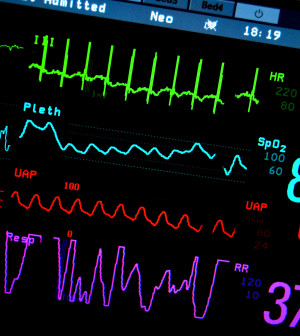- Could Your Grocery Store Meat Be Causing Recurring UTIs?
- Are You Making This Expensive Thermostat Error This Winter?
- Recognizing the Signs of Hypothyroidism
- 10 Strategies to Overcome Insomnia
- Could Artificial Sweeteners Be Aging the Brain Faster?
- Techniques for Soothing Your Nervous System
- Does the Water in Your House Smell Funny? Here’s Why
- Can a Daily Dose of Apple Cider Vinegar Actually Aid Weight Loss?
- 6 Health Beverages That Can Actually Spike Your Blood Sugar
- Treatment Options for Social Anxiety Disorder
Severe Obesity and Heart Failure

Severe obesity appears to be an independent risk factor for heart failure, a new study suggests.
Researchers from Johns Hopkins University in Baltimore reviewed data from more than 13,000 American adults, average age 54. After accounting for other risk factors such as high blood pressure, high cholesterol and diabetes, the researchers concluded that severe (morbid) obesity was a stand-alone risk factor for heart failure.
Heart failure occurs when the heart is weakened and cannot pump blood sufficiently to take care of the body’s needs.
Severe obesity is defined as having a body mass index of 40 or higher, according to the U.S. Centers for Disease Control and Prevention. Body mass index is a rough estimate of a person’s body fat. A BMI of 25 or below is generally considered normal weight.
Someone who is 5 feet 9 inches tall would have to weigh 271 pounds or more to be considered severely obese, the CDC said.
In the new study, adults who were severely obese had more than twice the risk of heart failure than those at a healthy weight. But they didn’t have a higher risk for heart disease or stroke.
While the findings suggest a strong, independent link between severe obesity and heart failure, it doesn’t prove cause and effect, the study authors said.
And even though treating high blood pressure, diabetes and other conditions in morbidly obese patients may help reduce their risk of heart disease and stroke, the study results suggest such treatment may not prevent increased risk of heart failure. Weight loss may be the only effective preventive measure.
“Obesity in our study has emerged as one of the least explained and likely most challenging risk factors for heart failure, because there is no magic pill to treat it, no drugs that can easily address the problem like there are for high cholesterol and high blood pressure,” said Dr. Chiadi Ndumele. He is an assistant professor of medicine and member of Hopkins’ Ciccarone Center for the Prevention of Heart Disease.
“Even with diet and exercise, people struggle to lose weight and keep it off, and for the morbidly obese, the struggle is often insurmountable,” Ndumele said in a university news release.
More than 5 percent of Americans are morbidly obese, according to the federal government.
“Even if my patients have normal blood sugar, cholesterol and blood pressure levels, I believe I still have to worry that they may develop heart failure if they are severely obese,” Ndumele said. “If our data are confirmed, we need to improve our strategies for heart failure prevention in this population.”
The study was published recently in the Journal of the American Heart Association.
More information
The U.S. National Institute of Diabetes and Digestive and Kidney Diseases outlines the health risks of being overweight.
Source: HealthDay
Copyright © 2026 HealthDay. All rights reserved.










